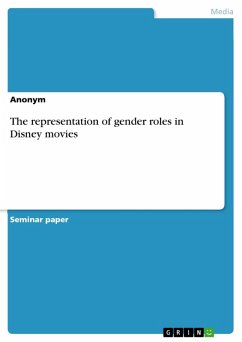
"A day without a Mexican": a persuasive analysis (eBook, PDF)
Sofort per Download lieferbar
Statt: 15,95 €**
13,99 €
inkl. MwSt. und vom Verlag festgesetzt.
**Preis der gedruckten Ausgabe (Broschiertes Buch)
Alle Infos zum eBook verschenkenWeitere Ausgaben:

PAYBACK Punkte
0 °P sammeln!
Seminar paper from the year 2006 in the subject Communications - Movies and Television, grade: A, Appalachian State University (Communication Studies), course: Theory of Persuasion, language: English, abstract: The United States has been described as a melting pot, i.e., a place where the previous identities of each immigrant group are melted down to create an integrated, uniform society. Since the 1960s, many Americans have rejected the melting pot metaphor in favor of the image of the mosaic, a picture created by assembling many small stones or tiles. In a mosaic, each piece retains its own ...
Seminar paper from the year 2006 in the subject Communications - Movies and Television, grade: A, Appalachian State University (Communication Studies), course: Theory of Persuasion, language: English, abstract: The United States has been described as a melting pot, i.e., a place where the previous identities of each immigrant group are melted down to create an integrated, uniform society. Since the 1960s, many Americans have rejected the melting pot metaphor in favor of the image of the mosaic, a picture created by assembling many small stones or tiles. In a mosaic, each piece retains its own distinctive identity while contributing to a larger design. Advocates of the mosaic metaphor assert that it better represents the diverse multicultural society of the United States. Today, many Americans value their immigrant heritage as an important part of their identity. More recent immigrant groups from Asia have established communities alongside those populated by the descendants of European immigrants. Although the United States has been shaped by successive waves of immigrants, Americans have often viewed immigration as a problem. Established Americans often look down on new immigrants. The cultural habits of immigrants are frequently targets of criticism, especially when the new arrivals come from a different country than those in the established community. Despite such tensions, economic needs have always forced Americans to seek immigrants as laborers and settlers, and economic opportunities have beckoned foreigners. The vast majority of immigrants to the United States have come in search of jobs and the chance to create a better life for themselves and their families. In all of American history, less than 10 percent of immigrants have come for political or religious reasons. Economic immigrants from Europe, Asia, and Latin America have come to the United States voluntarily. Others were involuntarily transported to North America to do forced labor or to be sold as slaves. Regardless of the reasons they come to the United States, new immigrants typically work in menial, labor-intensive, low-paying, and dangerous jobs-occupations that most other Americans shun. They are often treated with disdain until they assimilate, that is, adopt the mainstream American culture established by earlier immigrants. Of the 224 million people reporting their ancestry in the 1990 census, only 13 million, or 6 percent, identified themselves as Americans only. The rest chose one or more broad racial or linguistic groupings (such as African American or Hispanic) or national heritages (German, English, Irish, and Italian were most common) to define their origins.
Dieser Download kann aus rechtlichen Gründen nur mit Rechnungsadresse in A, B, BG, CY, CZ, D, DK, EW, E, FIN, F, GR, HR, H, IRL, I, LT, L, LR, M, NL, PL, P, R, S, SLO, SK ausgeliefert werden.













